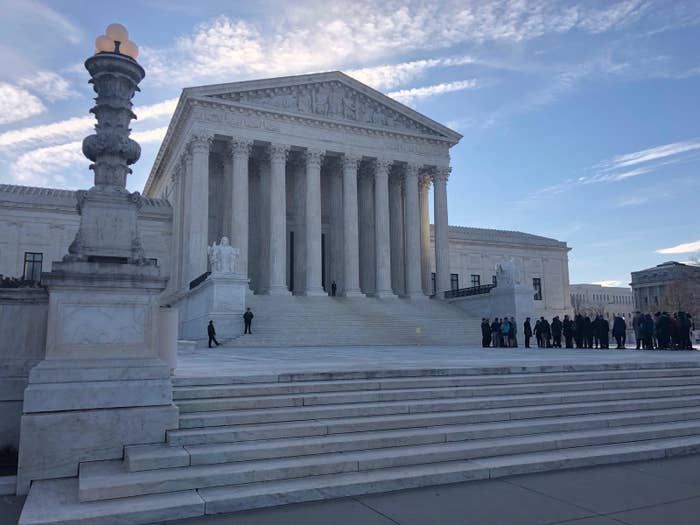
The Supreme Court on Monday morning turned down a request to consider whether Arizona's death penalty law, or the death penalty more broadly, is unconstitutional — with four justices expressing concern with the state's system for deciding who is eligible for the death penalty.
Abel Daniel Hidalgo, convicted of murder and sentenced to death in Arizona, asked the justices to consider whether the death penalty is constitutional — a question that Justice Stephen Breyer, supported by Justice Ruth Bader Ginsburg at times, has been asking the high court to reconsider since 2015.
At a minimum, Hidalgo asked that the court consider whether Arizona's death penalty law does enough to narrow who is eligible for the death penalty among those convicted of murder — a requirement to ensure that states with the death penalty are acting legislatively to "limit the class of murderers to which the death penalty may be applied." Hidalgo argued that the "aggravating factors" justifying a death sentence in Arizona are so many and so broad that nearly everyone convicted of murder there is eligible for the death penalty.
Neal Katyal, a partner at Hogan Lovells who served as acting solicitor general for a little more than a year during former President Barack Obama's first term, brought the case to the Supreme Court this past August — asking the court to take up Breyer's call, which he issued in a dissent to the Glossip v. Gross decision upholding Oklahoma's lethal injection protocol.
After keeping the case in limbo for months, the court on Monday took up neither issue. In doing so, however, four justices issued an unusual "statement respecting the denial of certiorari," concluding that the Arizona Supreme Court had misapplied prior US Supreme Court precedent regarding the "narrowing requirement" but agreeing "with the Court's decision today to deny certiorari."
Such statements in and of themselves are not unusual — Justice Sonia Sotomayor issued one in a different criminal case on Monday. The fact that Breyer was joined by three of his colleagues in his Hidalgo statement, however, suggests that, if the four had wanted to push the issue, they could have forced the court to take the case because while it takes five votes to win a case it only takes four justices to hear a case.
Breyer — joined by Ginsburg and Sotomayor, as well as Justice Elena Kagan — wrote that the question of whether the Arizona law actually narrows the class of people convicted of murder who are eligible for the death penalty is "an important Eighth Amendment question."
Breyer spent seven pages explaining why he believes the Arizona law does not have a constitutionally sufficient "narrowing requirement." Nonetheless, he concluded that "the record as it has come to us is limited and largely unexamined by experts and the courts below in the first instance." With a more fully developed record — evaluation of empirical evidence about the alleged lack of narrowing in the Arizona law — Breyer concluded that "the issue presented in this petition will be better suited for certiorari with such a record."
The unspoken force at play on Monday was Justice Anthony Kennedy, whose vote — along, increasingly, with Chief Justice John Roberts — generally controls the outcome in death penalty cases. Kennedy has ruled to narrow the classes of who is eligible for the death penalty in America and voted to overturn individual death sentences in extreme cases, but has generally opposed challenges to the method of execution and has not joined Breyer in his call for a wholesale review of the punishment's constitutionality.
Some liberal opponents of the death penalty, however, have been hopeful that, if faced with the question, Kennedy would side with the opponents. The possibility that President Donald Trump could nominate a replacement for Kennedy or one of the more liberal justices if any of them leave the bench had led some advocates to want to press the issue with the hopes that the current court would hear such a case.
Kennedy issued no statement regarding the decision not to hear Hidalgo's case.
Katyal, in a tweet Monday morning, expressed his disappointment that the court will not be hearing Hidalgo's case but maintained his hope that the Supreme Court, eventually, will conclude that "the death penalty, as practically administered in this country, is unconstitutional."
Unfortunately the Supreme Court denied review in our death penalty challenge #hidalgo. I remain convinced that SCOTUS will come to recognize that the death penalty, as practically administered in this country, is unconstitutional. It may be lawful in theory, just not in practice. https://t.co/7FzUns5bDt
Katyal declined further comment on the court's decision not to take Hidalgo's case.
Ben Cohen, a criminal defense lawyer in Louisiana who has asked the Supreme Court to take up similar cases in the past, saw some reason for those opposed to the death penalty to see a positive sign in Monday's order from the court.
"Justice Breyer and Ginsburg’s concern about the operation of our death penalty regimes identified in Glossip has spread to Justices Sotomayor and Kagan," he told BuzzFeed News on Monday. "The more one looks at the death penalty system, the closer one looks, the more broken and un-fixable it is."

